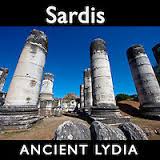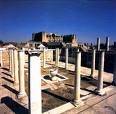
| Next | Previous | Index | Tellout Home |
15. Degenerate Sardis City
Revelation 3.1-6
 "To the Sardis' church angel write: These are the words of him who holds God's sevenfold Spirit and the seven stars. I know your deeds. You have a reputation of being alive, but you are dead. Wake up! Strengthen what remains and is about to die, for I have found your deeds unfinished in my God's sight. Remember, therefore, what you have received and heard. Hold it fast, and repent. But if you do not wake up, I will come like a thief, and you will not know when I will come to you. Yet you have a few Sardis people who have not soiled their clothes. They will walk with me, dressed in white, for they are worthy. The one who is victorious will, like them, be dressed in white. I will never blot out that person's name from the book of life but acknowledge that name before my Father and his angels. Whoever has ears, let them hear what the Spirit says to the churches." (Revelation 3.1-6) ✞
"To the Sardis' church angel write: These are the words of him who holds God's sevenfold Spirit and the seven stars. I know your deeds. You have a reputation of being alive, but you are dead. Wake up! Strengthen what remains and is about to die, for I have found your deeds unfinished in my God's sight. Remember, therefore, what you have received and heard. Hold it fast, and repent. But if you do not wake up, I will come like a thief, and you will not know when I will come to you. Yet you have a few Sardis people who have not soiled their clothes. They will walk with me, dressed in white, for they are worthy. The one who is victorious will, like them, be dressed in white. I will never blot out that person's name from the book of life but acknowledge that name before my Father and his angels. Whoever has ears, let them hear what the Spirit says to the churches." (Revelation 3.1-6) ✞
Sardis Church Angel
 "To the Sardis' church angel" means "to the messenger of the church in Sardis." The one who holds the seven spirits representing the Holy Spirit or "God's sevenfold Spirit" communicates to Sardis church's angel. The "seven stars" are leaders of the seven churches in Asia to which John of Patmos, under the guidance of the Holy Spirit, is writing his seven letters. Sardis was the ancient Lydian Empire's capital city and was prominent in the Roman world. A spiritual leader in Sardis City would receive the letter and would no doubt have relayed John of Patmos' words to the congregation or congregation there. ✞
"To the Sardis' church angel" means "to the messenger of the church in Sardis." The one who holds the seven spirits representing the Holy Spirit or "God's sevenfold Spirit" communicates to Sardis church's angel. The "seven stars" are leaders of the seven churches in Asia to which John of Patmos, under the guidance of the Holy Spirit, is writing his seven letters. Sardis was the ancient Lydian Empire's capital city and was prominent in the Roman world. A spiritual leader in Sardis City would receive the letter and would no doubt have relayed John of Patmos' words to the congregation or congregation there. ✞
Splendor and Decay
Sardis is also called Sardes and is at the site of the modern city of Sart in Turkey. Sardis was a city of great wealth and fame. Sir William Mitchell Ramsay (1851-1939), the Scottish archaeologist and New Testament scholar, wrote concerning Sardis City that "there was no greater example of the contrast between past splendor and present decay as in the degenerate Sardis City." Seven hundred years before John wrote Revelation, Sardis was one of the world's greatest cities. There, the King of Lydia ruled in oriental splendor over his empire in Asian Turkey. Its citizens eventually abandoned Sardis around 1402 AD. ✞
Sardis City
 Sardis stood as an impregnable fortress in the middle of the River Hermus valley plain. To the north rose the long ridge of Mount Tmolus. From that ridge, a series of hills went out like spurs, each forming a narrow plateau. On one of these spurs, fifteen hundred feet up, stood the original Sardis City. Despite its unassailable position, Jesus Christ gave the nominal, sleepy, and degenerate Sardis and its church a wake-up call. The sides of the ridge of Sardis City are smoothly steep, and only where the spur meets Mount Tmolus is there any possible approach, and even that isn't easy. Sardis City stands like some massive watchtower guarding the Hermus valley. The Greek name for "Sardis" is "Sardeis" and is a plural noun, for there were two Sardis cities, one on the high plateau and one in the valley. The narrow space on the plateau top was too small for the expanding occupation, and houses then developed below around the spur on which it stood. ✞
Sardis stood as an impregnable fortress in the middle of the River Hermus valley plain. To the north rose the long ridge of Mount Tmolus. From that ridge, a series of hills went out like spurs, each forming a narrow plateau. On one of these spurs, fifteen hundred feet up, stood the original Sardis City. Despite its unassailable position, Jesus Christ gave the nominal, sleepy, and degenerate Sardis and its church a wake-up call. The sides of the ridge of Sardis City are smoothly steep, and only where the spur meets Mount Tmolus is there any possible approach, and even that isn't easy. Sardis City stands like some massive watchtower guarding the Hermus valley. The Greek name for "Sardis" is "Sardeis" and is a plural noun, for there were two Sardis cities, one on the high plateau and one in the valley. The narrow space on the plateau top was too small for the expanding occupation, and houses then developed below around the spur on which it stood. ✞
King Croesus' Wealth
 John of Patmos addressed this Revelation letter to the Sardis church, whose former King Croesus' wealth (BC 595-546) was legendary. In his day, King Croesus (pronounced KREE-SES) was similar to Bill Gates or Warren Buffett. King Croesus reigned over Lydia for fourteen years from BC 560 until his defeat by King Cyrus of Persia in BC 546. The River Pactolus flowed through Lydia's lower town and was reputed to have had gold-bearing waters. However, the "gold" was, in fact, "electrum," which is a naturally occurring amalgam of silver and gold found on the river bed. Much of the King's wealth came from these river deposits.
John of Patmos addressed this Revelation letter to the Sardis church, whose former King Croesus' wealth (BC 595-546) was legendary. In his day, King Croesus (pronounced KREE-SES) was similar to Bill Gates or Warren Buffett. King Croesus reigned over Lydia for fourteen years from BC 560 until his defeat by King Cyrus of Persia in BC 546. The River Pactolus flowed through Lydia's lower town and was reputed to have had gold-bearing waters. However, the "gold" was, in fact, "electrum," which is a naturally occurring amalgam of silver and gold found on the river bed. Much of the King's wealth came from these river deposits.
The Midas Touch
The river "gold" is also the source of the legendary "Midas" or "the golden touch." Anything that Midas touched turned to gold! However, the real identity of Midas and the legend surrounding the "Midas touch" are unclear. A fascinating side story of this myth is that when Midas touched his daughter, she supposedly turned into a golden statue! King Croesus was considered the greatest of the Sardian kings, and his name was commemorated in the saying, "as rich as Croesus." Croesus was the first to issue gold coins with standardized purity and weight for general circulation. But Croesus had one critical flaw. With the King's great wealth, degenerate Sardis city reached its zenith, and it was with Croesus that it plunged to disaster, as is suggested by this Revelation passage. The angel says, "I will come like a thief, and you will not know at what time I will come to you." ✞
Solon's Warning
 Solon (BC 638-558), the so-called "wisest of the Greeks," visited Midas and warned King Croesus where Sardis was heading. With incredible arrogance, Croesus showed him all Sardis city's magnificence and wealth. Solon saw King Croesus's blind confidence that nothing could end his splendor and also the seeds of softness and degeneration. Croesus embarked upon a foolish war with King Cyrus 11 of Persia, otherwise known as Cyrus the Great (BC 576-530.) Croesus and his capital's greatness ended when he failed to heed the warning. To attack King Cyrus' armies, Croesus had to cross the Halys River. Before he advanced, he sought the counsel of Delphi's famous oracle and was told, "If you cross the river Halys, you will destroy a great empire." The river Halys is known today as the Kizilirmak River, which is the longest river in Turkey. King Cyrus' victory over Sardis brought about King Croesus's ultimate defeat at the Battle of Pteria when he crossed the Halys. ✞
Solon (BC 638-558), the so-called "wisest of the Greeks," visited Midas and warned King Croesus where Sardis was heading. With incredible arrogance, Croesus showed him all Sardis city's magnificence and wealth. Solon saw King Croesus's blind confidence that nothing could end his splendor and also the seeds of softness and degeneration. Croesus embarked upon a foolish war with King Cyrus 11 of Persia, otherwise known as Cyrus the Great (BC 576-530.) Croesus and his capital's greatness ended when he failed to heed the warning. To attack King Cyrus' armies, Croesus had to cross the Halys River. Before he advanced, he sought the counsel of Delphi's famous oracle and was told, "If you cross the river Halys, you will destroy a great empire." The river Halys is known today as the Kizilirmak River, which is the longest river in Turkey. King Cyrus' victory over Sardis brought about King Croesus's ultimate defeat at the Battle of Pteria when he crossed the Halys. ✞
Croesus' Ultimate Defeat
 Croesus assumed his campaign would be the climax of his power and King Cyrus' destruction. He crossed the river Halys, engaged in battle, and Cyrus routed his army. However, he was not worried, for he thought that all he had to do was retreat to Sardis' impregnable citadel, recuperate and fight again. King Cyrus's victory initiated the siege of Sardis. Cyrus waited for fourteen days, then offered a reward to anyone who could find a weakness in the city's defenses. Sardis' "Achilles Heel" turned out to be its crumbling rock. Though imposing as a fortress, the crumbling rock was more like close-packed dried mud. The properties of the Sardis rock meant that it naturally developed cracks. ✞
Croesus assumed his campaign would be the climax of his power and King Cyrus' destruction. He crossed the river Halys, engaged in battle, and Cyrus routed his army. However, he was not worried, for he thought that all he had to do was retreat to Sardis' impregnable citadel, recuperate and fight again. King Cyrus's victory initiated the siege of Sardis. Cyrus waited for fourteen days, then offered a reward to anyone who could find a weakness in the city's defenses. Sardis' "Achilles Heel" turned out to be its crumbling rock. Though imposing as a fortress, the crumbling rock was more like close-packed dried mud. The properties of the Sardis rock meant that it naturally developed cracks. ✞
Rock Fault
 In BC 546, a Persian Mardian soldier called Hyeroeades, from Iran (where Cyrus the Great originated), saw a Sardian soldier accidentally drop his helmet over the battlements. He then made his way down the precipice to retrieve it. Hyeroeades figured that there must be cracks in the rock and a pathway by which a troop of agile men could climb up and attack the city. That night, Hyeroeades led a party of Persian Mardian troops up along the fault in the rock. When they reached the top, they found, to their surprise, that the Sardis' battlements were entirely unguarded. The Sardians thought themselves too impregnable to even post a guard, and so Sardis fell. A city with a history like that knows what the Risen Christ means when he says, "If you do not wake up, I will come like a thief, and you will not know at what time I will come to you." ✞
In BC 546, a Persian Mardian soldier called Hyeroeades, from Iran (where Cyrus the Great originated), saw a Sardian soldier accidentally drop his helmet over the battlements. He then made his way down the precipice to retrieve it. Hyeroeades figured that there must be cracks in the rock and a pathway by which a troop of agile men could climb up and attack the city. That night, Hyeroeades led a party of Persian Mardian troops up along the fault in the rock. When they reached the top, they found, to their surprise, that the Sardis' battlements were entirely unguarded. The Sardians thought themselves too impregnable to even post a guard, and so Sardis fell. A city with a history like that knows what the Risen Christ means when he says, "If you do not wake up, I will come like a thief, and you will not know at what time I will come to you." ✞
Dead Sardis Church
 John of Patmos writes this Revelation letter to Sardis under an angel's instruction. It was in John's day a wealthy but unfortunately a dead church. Though once a magnificent citadel, Sardis is today only a rubble pile on a hilltop. There is no life or Spirit there. The once-great Sardians became soft, and twice they lost their city because they were too lazy to keep watch. The church's vitality has gone, and it was a corpse instead of a living community. It is a warning to Christians of the death trap of lethargy.✞
John of Patmos writes this Revelation letter to Sardis under an angel's instruction. It was in John's day a wealthy but unfortunately a dead church. Though once a magnificent citadel, Sardis is today only a rubble pile on a hilltop. There is no life or Spirit there. The once-great Sardians became soft, and twice they lost their city because they were too lazy to keep watch. The church's vitality has gone, and it was a corpse instead of a living community. It is a warning to Christians of the death trap of lethargy.✞
Nominal Christians Warning
 The Sardis church is a picture of nominal Christianity, busily being religious but lacking spiritual life. Douglas Wilson disagrees with the "nominal Christian" notion in "Reformed is Not Enough." He argues that all the baptized enter into a covenant with God and are obliged to serve him. Therefore, there is "no such thing as a nominal Christian any more than we can find a man who is a nominal husband!" The Sardis church is ordered by God to "wake up." With this call comes the possibility of recovery and new life. The degenerate Sardis city and church should be able to get back her power but fails.✞
The Sardis church is a picture of nominal Christianity, busily being religious but lacking spiritual life. Douglas Wilson disagrees with the "nominal Christian" notion in "Reformed is Not Enough." He argues that all the baptized enter into a covenant with God and are obliged to serve him. Therefore, there is "no such thing as a nominal Christian any more than we can find a man who is a nominal husband!" The Sardis church is ordered by God to "wake up." With this call comes the possibility of recovery and new life. The degenerate Sardis city and church should be able to get back her power but fails.✞
Result for Sardis Christians
 A few people in the Sardis Church who walked with Jesus received a holy white garment because they were worthy. "Be watchful," said Jesus or, "I will come like a thief, and you will not know at what time I will come to you." He may come unexpectedly when they least expect it. Even despite its imposing vertical walls and fortifications, Sardis had fallen because it had not kept watch. "Remember, therefore, what you have received and heard; hold it fast," says the Lord. Failure means that Christ will come to them when they least expect it "like a thief in the night." "Yet you have a few people in Sardis who have not soiled their clothes." Rather than soiled clothing in this cloth-making city, a faithful few will wear holy white garments. ✞
A few people in the Sardis Church who walked with Jesus received a holy white garment because they were worthy. "Be watchful," said Jesus or, "I will come like a thief, and you will not know at what time I will come to you." He may come unexpectedly when they least expect it. Even despite its imposing vertical walls and fortifications, Sardis had fallen because it had not kept watch. "Remember, therefore, what you have received and heard; hold it fast," says the Lord. Failure means that Christ will come to them when they least expect it "like a thief in the night." "Yet you have a few people in Sardis who have not soiled their clothes." Rather than soiled clothing in this cloth-making city, a faithful few will wear holy white garments. ✞
"Degenerate Sardis City"
by Ron Meacock © 2021
| ^Top Page | Next | Previous |